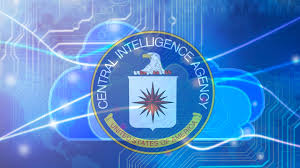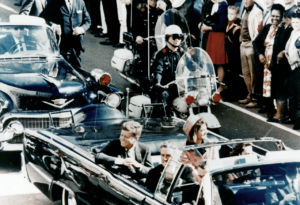Almost 60 percent of Americans believe in conspiracy theories about JFK. Here’s why that might be a problem.
 November 22nd marks 55 years since the assassination of President John F. Kennedy in Dallas, Texas. More than half a century after the event, a majority of Americans believe that more people were involved with the killing than simply Lee Harvey Oswald. Joseph E. Uscinski takes a close look at Kennedy conspiracy theories, arguing that one of the reasons they appeal so much is that there are so many of them. He writes that these beliefs, while appearing to be relatively harmless, have been fueled by the government’s often lack of transparency over the years, which may have helped to further erode trust in public officials.
November 22nd marks 55 years since the assassination of President John F. Kennedy in Dallas, Texas. More than half a century after the event, a majority of Americans believe that more people were involved with the killing than simply Lee Harvey Oswald. Joseph E. Uscinski takes a close look at Kennedy conspiracy theories, arguing that one of the reasons they appeal so much is that there are so many of them. He writes that these beliefs, while appearing to be relatively harmless, have been fueled by the government’s often lack of transparency over the years, which may have helped to further erode trust in public officials.
As we approach the 55th anniversary of the Kennedy assassination, we will once again be bombarded with a deluge of conspiracy theories. Did the CIA, the military, or the defense industry kill Kennedy? Or was it then Vice President Lyndon Johnson? Maybe it was a foreign power, like Castro or the Soviets who orchestrated the killing. Or maybe the assassination happened just as Oliver Stone depicted in his 1991 movie JFK, and the conspirators included an array of Army generals, Mafiosos, FBI agents, Dallas Police, Cuban Dissidents, the New Orleans gay community, and defrocked pedophile priests. As Americans every November contemplate what could have been in the remainder of the Kennedy presidency, they seem compelled to also consider who really pulled the trigger that tragic November afternoon.
Most conspiracy theories come and go with little notice. It is only a select few that garner a sizable enough audience to register on public opinion polls, and even fewer that can stick around for decades on end. For example, after Supreme Court Justice Antonin Scalia died in 2016, many people including Donald Trump, suggested that something fishy was going on. After a flash in the pan, those theories suggesting that Scalia was assassinated by the Obama Administration quickly petered out.
But, it seems no matter how much time has passed, and how little definitive contradictory information has come forward, majorities of Americans have never gotten comfortable with the official lone gunman explanation for Kennedy’s death. Polls since the assassination show that never less than a majority of Americans have bought into one Kennedy conspiracy theory or another. By the mid-1970s four-fifths of Americans believed that more people than just Lee Harvey Oswald were involved and still around 60 percent believe as much.
The sheer numbers of people who refuse to believe the Warren Report’s official findings signal a chilling amount of distrust toward the Supreme Court and other US institutions. As we recognize the assassination this November 22nd, here are two important points to consider about Kennedy Assassination conspiracy theories.
The Numbers Continue to be high because the Theories Are So Fluid
That majorities as high as sixty percent of Americans continue to buy into Kennedy assassination theories is a shockingly high number, especially when considering that few conspiracy theories are able to attract much notice. For comparison, consider that more recent conspiracy theories – like those surrounding the terror attacks of 9/11 and Barack Obama’s birth certificate don’t even come close. In 2013, only 11 percent believed that the government knowingly allowed the attacks to happen; in 2016 25 percent believed that the government definitely or probably planned the attack. In 2012 20 percent of Americans believed that Barack Obama was born outside of the US. Given that they have been more contemporary and more newsworthy in recent decades, one might assume these theories would rival Kennedy theories, but they don’t seem to come close in terms of popularity.

“CINEASTE365: JFK documentaries (November 21, 2013 – Day 040)” by Dennis Amith is licensed under CC BY NC 2.0
Part of the reason for the continued widespread belief in Kennedy conspiracy theories is that there are so many different versions that one can believe in. And because most polling houses ask if people believe there was a greater conspiracy at work in the assassination, as opposed to asking about a specific theory or villain, anyone who believes in any version of the conspiracy theory featuring any villain or villains can say “yes” to the standard polling questions. But when pollsters dig a bit deeper and ask respondents who orchestrated the conspiracy, the majority fragments. In 2013, Gallup asked for respondents’ best guess as to who was involved in the assassination – 13 percent fingered the Mafia, 7 percent the CIA, and 5 percent Castro. Respondents named more than 17 villains in total. But in most survey questions about conspiracy theories, respondents will be asked to agree or disagree with one specific account with one specific villain, i.e., did President Bush know about the 9/11 attacks before they happened?
Media and the Government Influence Belief in Kennedy Assassination Theories
As much as conspiracy theories are viewed as attacks against our most sacred institutions, those institutions are often to blame for propagating conspiracy theories. Kennedy conspiracy theories are no different. The government’s conclusions about the assassination may have been correct overall, but there was a purposeful rush to judgement to prevent a dangerous reaction during the Cold War. This backfired as the hastiness of the Warren Report led many to view the Commission’s conclusions as predetermined.
More than fifteen years after the assassination, United States House of Representatives Select Committee on Assassinations issued its own verdict. After two years of investigations, the committee determined that Kennedy was likely killed by a conspiracy. However, their conclusions were not much more specific than that. After further examination of their key audio evidence some years later, other more scientific bodies concluded that the committee’s verdict was uncorroborated at best. Since the late 1970s, the government has been called upon to release documents pertaining the assassination. At almost every opportunity, it has failed to be transparent and has held back documents from public view, only fanning the flames for conspiracy theorists.
Beyond the government’s actions, the media has continued to push Kennedy conspiracy theories near constantly, and with great effect. Most prominently, Oliver Stone’s high profile movie JFK concocted almost out of whole cloth a conspiracy involving thousands of actors to kill and then cover-up the assassination. But underneath Stone’s blockbuster, are thousands of books, television shows, and news stories that keep the conspiracy theory alive. It is to the point that no discussion of Kennedy can be had without mention of the possible conspiracy.
How concerned should we be that most Americans cannot accept the official account of one of America’s most infamous murder cases? Do Kennedy conspiracy theories undermine our political institutions and our democracy? The answers are complex. Unlike other conspiracy theories suggesting contemporary wrongdoing, few people are taking up arms to protest the Kennedy Assassination. This is a good thing. But on the other hand, many conspiracy theorists use the Kennedy Assassination theories as evidence of other supposed conspiracies. For example, some people claim that the term “conspiracy theory” was invented by the CIA to put a stop to conspiracy theories about the Kennedy Assassination. (This claim is demonstrably false, and if it were true, it would have been the most ineffective plot ever). Those who believe in Kennedy conspiracy theories really do believe that there was a conspiracy 55 years ago that continues to this day. There is no reason to think that that distrust cannot breed more distrust.
Please read our comments policy before commenting
Note: This article gives the views of the author, and not the position of USAPP– American Politics and Policy, nor of the London School of Economics.
Shortened URL for this post: http://bit.ly/2DS6Gg7
About the author
 Joseph E. Uscinski – University of Miami
Joseph E. Uscinski – University of Miami
Joseph E. Uscinski is Associate Professor of Political Science at University of Miami, College of Arts & Sciences.
*** This article has been archived for your research. The original version from USAPP American Politics and Policy (blog) can be found
This article has been archived for your research. The original version from USAPP American Politics and Policy (blog) can be found here.
***



